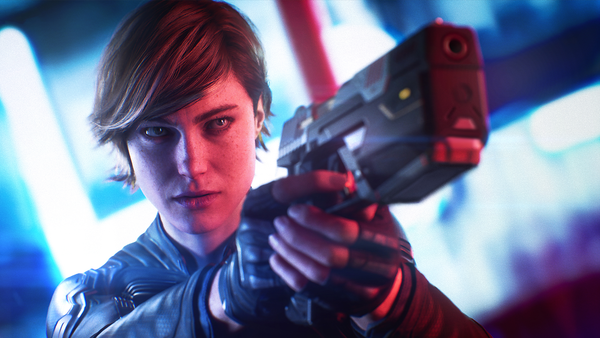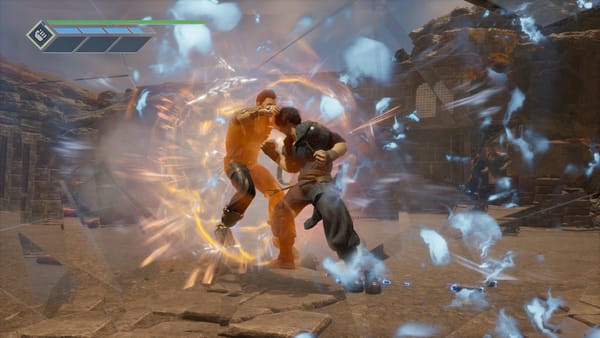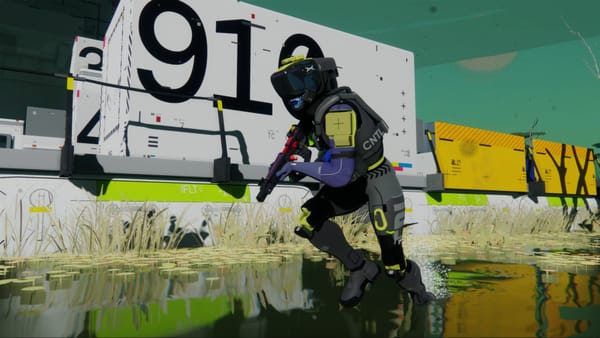#99: On tour
Why Gran Turismo 7 is the dad-game of the generation so far.
[Thanks for reading Hit Points! If this is your first time, then a hearty welcome to you. If you enjoy today’s edition, note that you can sign up for free to get this thrice-weekly look at the latest goings on in the game industry sent straight to your inbox, and in the process earn my eternal adoration and respect.]
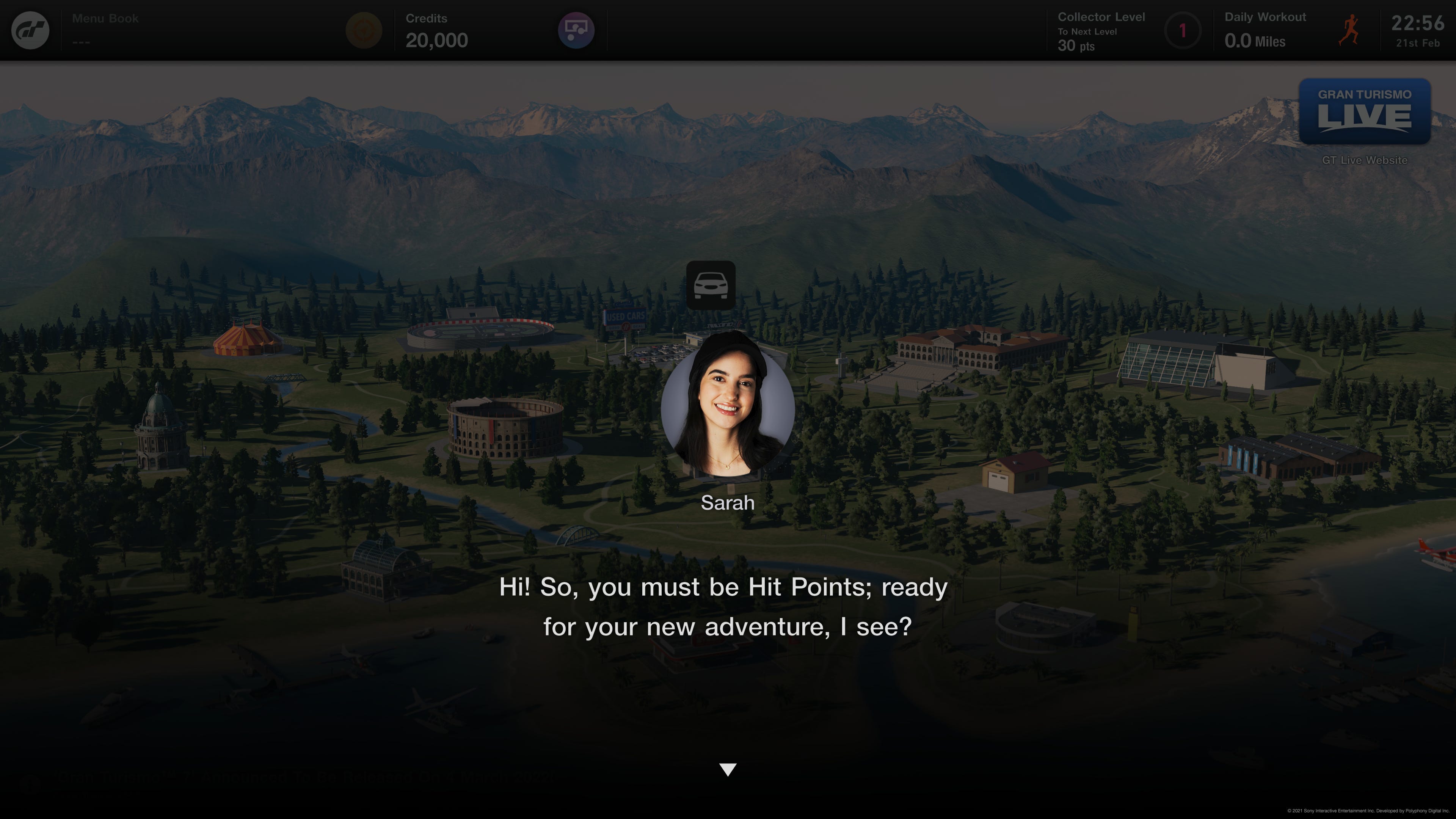
Hello! Let us cast our minds back to last November, and Hit Points #72, which among other things took issue with the tonal split personality on display in Forza Horizon 5 — one caused by its attempt to simultaneously cater to series veterans, and a new, younger audience who may never have played a Forza game before. In the process, I felt that it probably ended up alienating both camps. I called this new phenomenon the dad-game problem. Let us recap:
“It seems that the terms of engagement have shifted somewhat. It is no longer merely a question of how you make the latest sequel to a 20-year-old game relevant to established series fans who are now 20 years older. Now it is also about how you make those games appealing to the generation, or generations, below them. People who have very different expectations and aspirations for what games should look like, and feel like; for how they should present themselves, and what they might allow you to do.
“I was reminded of all this yesterday by Forza Horizon 5, a game whose numerical subtitle makes clear its dad-game credentials, but has this weirdly split personality. It is a serious driving game for serious driving-game fans, but is dressed up in Gen Z clothes. Its character creator, while allowing for a welcome degree of fluidity and representation, ultimately insists you look like some flavour of Love Island contestant. There is incessant banter over bland shopping-centre dance music. Everyone is young and attractive and simply will not shut up, ever, because heaven forbid you concentrate on driving a very fast car. This is not a driving game, it says. This is a festival! A welcoming, inclusive celebration of… well, something! Go wild, have fun, express yourself! That said, you did just crash your car quite badly into the side of a building because we’re pretty finicky about torque and traction and braking distances and all that, and you have now lost the race.”
When Sony showed off Gran Turismo 7 in a State Of Play special last month, I was rather taken with it, in large part because of the markedly different approach it seemed to take to the whole dad-game thing. It seemed thoroughly at ease with itself; like a game that knew it was for a specific audience, and had long since made its peace with it. It looked collected, confident, refined even, and I thought Hit Points should cover it somehow. To my surprise, an old PR pal at Sony agreed. And so I’ve spent the past week-and-a-bit dipping in and out of it in between work commitments and Elden Ring sessions. And my, what a lovely time I’ve had.
This is not a review of Gran Turismo 7, per se. I have not played it for dozens of hours, and even if I had I would not be able to critically assess its driving model, its course design or the authenticity of its cars. I’ve reviewed a driving game or two in my time, but I was never really cut out for it. Not enough fireballs, you see, or punching. But I am absolutely a dad, both literally and spiritually. And I like driving — not least because, living as I do with two kids and a puppy, it is one of the few situations where I actually feel in control of things.
I am also at the age where one begins to appreciate the finer things in life. At some point — your late 30s, I think, or early 40s, though YMMV — you may suddenly realise you have become the sort of person who knows a bit about coffee, or wine, or golf or audio equipment or something. You might develop strong opinions on the making of certain cocktails. Perhaps people will say you have too many jackets (incorrect). You might call this a midlife crisis! I would respectfully disagree. I think it is a combination of accumulated knowledge and experience, and having a little more disposable income as you grow older. (And also really liking jackets.) Either way Gran Turismo 7 is, I believe, a perfect game for that sort of person — the discerning, thoughtful sort, who if not appreciating something themselves can at least appreciate someone else’s knowledge of, and passion for the subject — regardless of how nerdy they are about cars.
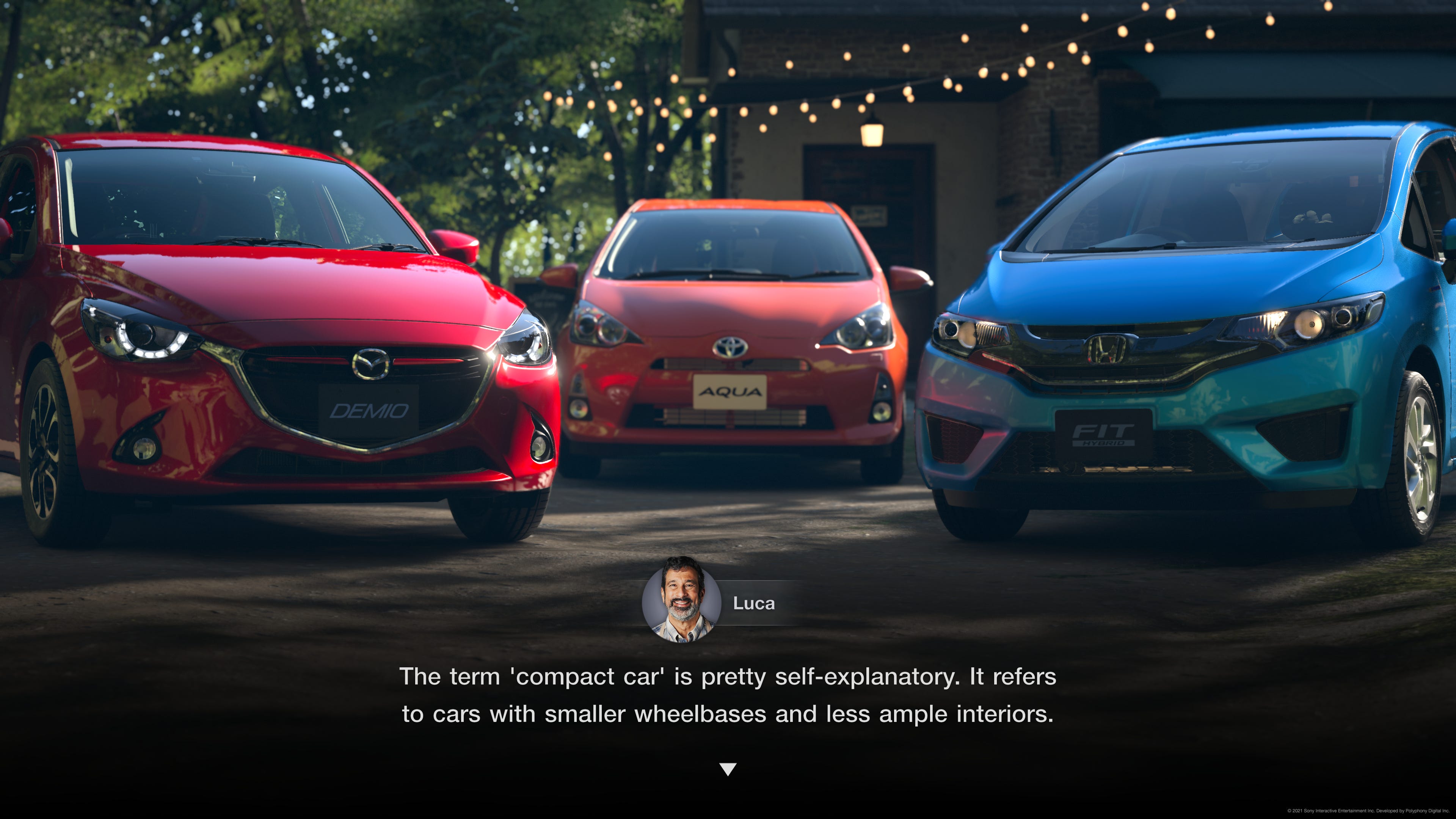
The thing with Forza Horizon 5 is that, while it is of course a driving game, it never quite feels like a game about cars. It is a luxe-ish resort holiday, a festival with proper bogs and showers; it is a somewhat vanilla escapist fantasy that you just so happen to view through the windscreen of a $250,000 supercar. It feels to me far more interested in its location, its smorgasbord of activities, and its endlessly bantering characters than its vehicles, even if it has several thousand of them on offer and all of them have been rendered with fervent authenticity. That, I think, is a natural consequence of it trying to appeal to so broad a spectrum of people — to players of vastly divergent ages, tastes and abilities. You don’t like cars? That’s fine! Come through, stick some tunes on and smash a few billboards! Buy a house, some unbranded sunglasses and a distressed denim jacket, and take some photos. Gran Turismo 7, however, is first and foremost a game about cars. Actually, no: it is exclusively about cars. It fucking loves the things, and it really wants you to love them too.
This reverence for the subject matter is made abundantly clear in the opening cinematic, a lavishly overproduced montage of archive footage and newspaper clippings that documents the complete history of the motorcar. It is shot through with other notable moments from the era: the sinking of the Titanic, the Second World War, and headshots of Hollywood luminaries such as Charlie Chaplin. It says: cars are not just cars, gang. Cars are history. Cars are culture. Cars? Cars are life.
The structure is delightfully economical. Your main point of contact is Luca, owner of the local coffee shop — a venue seemingly only chosen so Polyphony can ray-trace the shit out of some fancy kitchenware. You have never seen such videogame coffee cups, nor witnessed virtual cutlery with so lustrous a shine. I do not know how many developers signed up thinking they were making a driving game and instead spent their days rendering wine glasses and plates, but I am deeply appreciative of their work. Your tasks are broken up into what Luca calls ‘menu books’: little shopping lists or one-shot quests designed to ease you into and through the game. Your first order of business is to collect three Japanese compact cars: you get one for free, and the others as rewards for winning specific races. At times you’ll be asked to tune up a car, or get your B licence by completing some basic driving tests, but generally the game offers a simple proposition: drive this car reasonably well, and we’ll give you a faster one.
It’s a graceful on-ramp, pardon the pun, just there to give the thing some structure and texture without making it feel too overtly like a traditional career mode — perhaps, I like to think, because it knows the last thing a dad needs is another job. I assume this loop continues until you’re hooning around the place in a supercar I cannot even spell, much less afford, but that is likely many hours away and I feel this is a game best taken, ironically enough, in low gear. I dip in and out for the odd half-hour, and it makes me feel fulfilled and oddly calm, like one of the nice cakes I assume Luca’s coffee shop sells when he’s not busy singing the praises of mid-’90s family cars. I’d been stuck on a boss in Elden Ring for over a day. I switched over to GT7, knocked out a quick menu book, then went back and beat the boss first time.
It’s a fine palate cleanser between Elden Ring sessions, then, and a striking counterpoint to Forza Horizon 5 as well. Forza wants to hook you in, and so builds its extravagant opening set-piece around an array of glossy, expensive cars, then plasters its map with icons, ensuring you are never more than two turns away from a dopamine top-up. GT7 makes you do laps in a wee Hyundai with a top speed of 70mph, and if you win it’ll give you a Nissan that can do 75. Above all, Forza seems a bit needy, oddly desperate to make you happy. Gran Turismo 7 assumes you already are.
It is not perfect, sure. The music — something Hit Points thinks about probably too much — is very disappointing, the in-race soundtrack mostly comprised of the sort of crunching mid-2000s rock you’d expect to hear in a Yakuza fight. When you’re tooling around in menus, there’s a pleasant mix of airy deep house and lounge-y jazz, but the song changes every time you enter or exit a menu tree, so nothing ever plays for more than a few seconds. And while it’s a handsome thing — and in addition to its predictably attractive car models, a special mention for its sumptuous cloud formations — there’s a noticeable downgrade in the transition from the race intro, which is extravagantly ray-traced and stunning, to the realtime action, which looks merely very good. Replays are ray-traced too, mind you, which means I finally have a reason to watch my performances back. I do tend to look away at corners, though.
Polyphony’s enthusiasm for the whole endeavour, however, is quietly irresistible. Complete a menu book and Luca gives you a potted history of the cars you’ve just won — where they came from and when they were made, how they work, why people liked them — over voyeuristic ray-traced close-ups of the cars themselves. Gran Turismo 7 doesn’t just want you to drive cars. It wants you to understand them, to know their histories, to place them in a bigger, wider context. It wants you to love cars as much as it does. And look, that’s probably not going to be me, I’m afraid. But Dad respects the intention an awful lot, and the execution too.
MORE!
- Amazon’s cloud-streaming service Luna has formally launched in the US. While it’s a standalone subscription service, Prime members get access to a revolving slate of games, beginning with Devil May Cry V, Observer and others. Hit Points will kick Luna’s tyres if it makes it to the UK before Amazon does a Stadia on it.
- Square Enix has revived Dungeon Siege after more than a decade in the wilderness, sort of. It’s in The Sandbox, that disaster of a crypto/metaverse play Hit Points covered a while back.
- Tokyo Game Show will be an in-person event when it returns this September — the first time it has done so since 2019, for obvious reasons. I see no point breaking the habit of a lifetime here, so: if anyone’s reading and wants to fly me out there to cover it, I would love to. Never managed to wangle it, sadly, though not for want of trying.
- There will be no Super Smash Bros tournament at Evo 2022, which is terrible news for a community that’s ensured the series has had a presence at the biggest show on fighting-game Earth, often with no support from Nintendo, since 2007. It’s also good news for those of us who have often tried to stay up all night to watch Evo’s climactic Street Fighter finals, and fallen asleep during Smash because they don’t understand it and it bloody goes on forever. Ahem.
- Bandai Namco is raising the base salary of all Japanese staff by an average of $435 per month. It also plans to introduce what it calls “activity-based working”, which sounds pretty transformative for an employer in a country whose working culture has long been defined by presenteeism. Good stuff.
- Nvidia is the latest tech company to suffer a security ouchie, with reports claiming a hacking group has made off with 1TB of data — including the source code to DLSS.
- The Playdate SDK is now free to all. Lovely.
- Over at Vice, Hit Points pal Patrick Klepek spoke to a number of developers whose employers are hopping on the NFT bandwagon. Unsurprisingly, all of them seem to hate it.
- Valve says it is confident that the supply-chain issues that saw Steam Deck delayed from its originally planned launch window are easing, and that it will be manufacturing hundreds of thousands of units a month in due course.
There we go! That was fun, wasn’t it. Hit Points turns 100 very soon, and I intend to do another state-of-the-union sort of thing, similar to #50. Can I get that done by Friday? Let’s find out. See you soon either way. Oh, and please hit the buttons below! It really helps.



